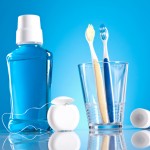
Twice daily removal and disruption of dental plaque is important for maintaining good oral health. Toothbrushing is the most common method, but it cannot adequately clean interdental areas. Various approaches to interdental cleaning have been using including dental floss, wood sticks, oral irrigators, and interdental brushes (IDBs). Recently a new interdental device had been introduced, the rubber or elastomeric bristles interdental cleaners (RBIC).
The aim of this review was to assess to the efficacy of rubber bristles interdental cleaners (RBIC) as an adjunct to toothbrushing (TB) compared to other interdental cleaning devices and toothbrushing alone.
Methods
Searches were conducted in the Medline/PubMed, and the Cochrane Central Register of Controlled Trials (CENTRAL) for randomised controlled trials (RCTs) or controlled clinical trials (CCTs) published in English. Two reviewers independently screened and selected the studies and assessed quality. Data was extracted and summarised and metanalyses conducted where possible. The primary variable were plaque (PI), bleeding (BS), and gingival index (GI) scores.
Results
- 6 RCTs (5 parallel, 1 cross-over) reporting 10 comparisons were included.
- 2 studies used a split-mouth design with randomly assigned quadrants undergoing interdental cleaning.
- 5 RCTs compared RBICs with interdental brushes (IDBs), 4 with dental floss (DF) and one with manual TB only. No comparisons to wood sticks were retrieved.
- All 6 studies provided a baseline prophylaxis with study durations from 4-6 weeks.
- Most studies showed no differences between DF, IDB or RBICs for plaque scores, GI or BS.
- Meta-analysis (2 studies) showed no difference in
- Plaque scores between RBIC and IDB, Mean Difference (MD) = -0.1(95%CI; -0.10 to 0.08)
- Bleeding scores between RBIC and DF, MD = -0.47 (95%CI; -8.88 to 0.74).
- RBICs caused fewer gingival abrasions and were preferred by the study participants.
Conclusions
The authors concluded: –
…… in gingivitis patients, a weak to very weak certainty exists that a RBIC is indicated for gingivitis and plaque reduction. The evidence supports user safety and participants’ preferences.
Comments
This review has followed a good methodology reporting in line with the PRISMA statement with the protocol available on the PROSPERO database. Interdental cleaning is seen as an important adjunct to routine toothbrushing and the effectiveness of several types of interdental device were assessed in a Cochrane review in 2019 (Dental Elf – 15th Apr 2019). The Cochrane review only included 1 small RCTs of RBICs so this new review adds a number of additional studies. Helpfully the authors highlight a number of limitation with the review including the short duration of the studies, heterogeneity of the study designs, brands, assessment parameters and industry involvement. In addition, the participants studies had relatively low baseline levels of disease and inflammation so the findings may not be generalisable to those with more widespread disease. While the two major databases searched are likely to have included all the relevant English language review it is possible that some relevant studies could have been excluded a point noted by the authors. Overall, the limited number of small studies and their limitations means that the findings should be interpreted cautiously and additional well conducted and reported studies of appropriate size and duration are needed to clarify their effectiveness.
Links
Primary Paper
van der Weijden F, Slot DE, van der Sluijs E, Hennequin-Hoenderdos NL. The efficacy of a rubber bristles interdental cleaner on parameters of oral soft tissue health-a systematic review. Int J Dent Hyg. 2021 Feb 25. doi: 10.1111/idh.12492. Epub ahead of print. PMID: 33630360.
Other references
Dental Elf – 15th Apr 2019
Interdental cleaning devices for prevention and control of caries and periodontal disease
Dental Elf – 27th Jun 2016
